Environmental Geoscience
UCAS code F7F6
- Study mode
- Full-time
- Duration
- 3 years
- Start date and application deadlines
-
- Start date
UCAS code F7F6
Study Environmental Science at Liverpool and become part of the solution in tackling climate change and other environmental challenges. You’ll gain the skills necessary to understand how the most important aspects of planet Earth work, and how to apply that knowledge to make a difference.
To save the planet, we need to understand the planet. You will develop key knowledge and skills to help tackle the effects of climate change and ensure a sustainable environment for all.
You’ll graduate with a broad knowledge of environmental science, and a range of skills spanning problem solving, numeracy and coding, field work, data acquisition, and report writing and communication skills, all designed to equip you for a career helping maintain a sustainable environment on our planet.
You will be taught by research-active staff, at the forefront of their chosen fields, within small groups for a collaborative and conversational experience.
By the time you graduate, our extensive field training will have equipped you with the specific practical skills necessary for a career in Earth Sciences.
A number of the School’s degree programmes involve laboratory and field work. Fieldwork is carried out in various locations, ranging from inner city to coastal and mountainous environments. We consider applications from prospective disabled students on the same basis as all other students, and reasonable adjustments will be considered to address barriers to access.
This degree is accredited by the Geological Society of London, satisfying the requirements of Fellowship and Chartered Geologist status.

We’re proud to announce we’ve been awarded a Gold rating for educational excellence.
Discover what you'll learn, what you'll study, and how you'll be taught and assessed.
ENVS117 is a compulsory module for those without A level Maths or Physics at grade C or above. You should discuss this with your programme director at the start of the academic session.
Programme details and modules listed are illustrative only and subject to change.
Programme details and modules listed are illustrative only and subject to change.
In year 3 you will carry out an independent research project on a topic and location of your choice.
ENVS300 is a research project that can take place in the field, laboratory or a combination. If students choose a geological field mapping project, data collection in the field will take place in summer between Years 2 and 3. If students choose a laboratory project, data can be collected in the summer between Years 2 and 3 and during Semester 1 of year 3. Report write-up will take place in Semester 1 and 2.
Students must select one field class module from ENVS362 and ENVS375.
| Compulsory modules | Credits |
|---|---|
| THE LIVING, EVOLVING EARTH (ENVS320) | 15 |
| EARTH SCIENCE PROJECT (ENVS300) | 30 |
| APPLIED ENVIRONMENTAL GEOSCIENCE (ENVS331) | 15 |
Programme details and modules listed are illustrative only and subject to change.
Teaching takes place through a mix of lectures, practical work, workshops, seminars, tutorials and fieldwork, with an emphasis on learning through doing. Students value the learning opportunities provided by field classes, including the rapid and detailed feedback on performance.
You will typically receive 15-20 hours of formal teaching each week, and complete between 50 and 100 days of residential fieldwork over the course of the programme. All research projects are supervised by a member of staff who will meet with you on a weekly, or more frequent, basis.
Field work is carried out in various locations, ranging from inner city to coastal and mountainous environments. We consider applications from prospective students with disabilities on the same basis as all other students, and reasonable adjustments will be considered to address barriers to access.
Assessment matches the learning objectives for each module and may take the form of written exams, practical laboratory and computer examinations, coursework submissions in the form of essays, scientific papers, briefing notes or lab/field notebooks, reports and portfolios, oral and poster presentations and contributions to group projects, and problem-solving exercises. Assessment is via tasks that mirror those graduate students are likely to undertake working as professional geoscientists. For example, generating and interpreting quantitative spatial data, with appropriate consideration of inherent uncertainty, is a key task and necessary skill for professional environmental geoscientists, and this skill is developed and assessed on several programme modules, especially field and lab-based modules. As well as being authentic in terms of the underlying purpose of the assessed task, assessment tasks are also authentic in terms of format, intended audience, resources used, and collaborative team elements. For example, team-based environmental assessment work with professional format delivery appropriate for presentation to management-level colleagues using state-of-the-art field, lab or IT resources is central to assessments in field classes.
We have a distinctive approach to education, the Liverpool Curriculum Framework, which focuses on research-connected teaching, active learning, and authentic assessment to ensure our students graduate as digitally fluent and confident global citizens.
The Liverpool Curriculum framework sets out our distinctive approach to education. Our teaching staff support our students to develop academic knowledge, skills, and understanding alongside our graduate attributes:
Our curriculum is characterised by the three Liverpool Hallmarks:
All this is underpinned by our core value of inclusivity and commitment to providing a curriculum that is accessible to all students.
The qualifications and exam results you'll need to apply for this course.
| Qualification | Details |
|---|---|
| A levels |
BBC (including ) |
| BTEC Level 3 national extended diploma |
DDM. Forensic Science is not accepted. |
| BTEC combinations |
BTEC National Diploma DM plus a science subject at A level grade B; BTEC National Extended Certificate M plus a science subject at A level grade B another A level grade B. |
| Welsh Baccalaureate Advanced |
C in the Welsh Baccalaureate, plus BB at A level including a science subject at grade B. |
| Access |
Pass relevant Access to HE Diploma with 45 Level 3 credits with 27 at Distinction and 18 at Merit |
Studying with us means you can tailor your degree to suit you. Here's what is available on this course.
University of Liverpool students can choose from an exciting range of study placements at partner universities worldwide.
Immerse yourself in Chinese culture on an optional additional year at Xi'an Jiaotong Liverpool University in stunning Suzhou.
Broaden your world by spending an additional year of study at a partner university abroad following your second year of study.
Spend a summer abroad on a study placement or research project at one of our worldwide partner institutions.
Year in industry placements give you an in-depth workplace experience where you can develop your skills and apply your learning.
You don't need to decide now - you can choose to add a year in industry after you've begun your degree.
To spend a year in industry, you'll need to secure a placement with an organisation. If you're unable to find a placement, you'll continue with the standard version of the course without a year in industry.
Every student at The University of Liverpool can study a language as part of, or alongside their degree. You can choose:
Your course will be delivered by the Department of Earth, Ocean and Ecological Sciences. Our unique partnership with the Marine Biological Association allows our students access to their specialist staff, laboratories and equipment. We also have close links with the National Oceanography Centre, and the award-winning Central Teaching Laboratories provides a state-of-the-art facility for practical work.
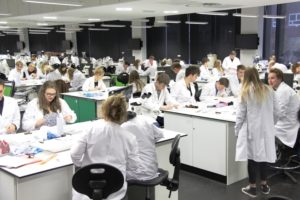
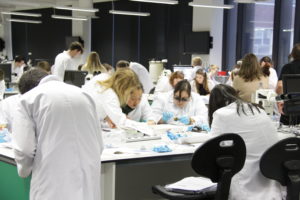
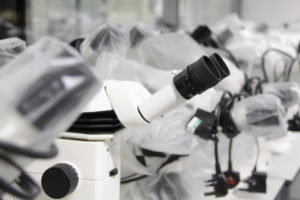
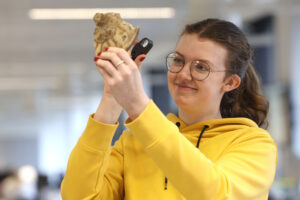
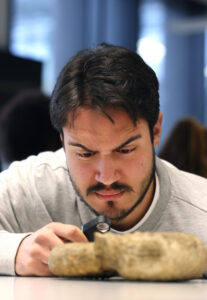

Discover what you’ll study, the facilities and resources you’ll have access to, and how we’ll prepare you for your future career.

Want to find out more about student life?
Chat with our student ambassadors and ask any questions you have.
Discover what you’ll study, the facilities and resources you’ll have access to, and how we’ll prepare you for your future career.
The skills gained through studying a degree in Environmental Science are applicable in many areas of employment, from environmental protection and consultancy, planning and conservation, through to the geotechnical, mineral and energy resource industries, as well as careers in scientific research or academia.
89.5% of environmental sciences students are in work and/or further study 15 months after graduation.
(Discover Uni, 2018-19.)
Your tuition fees, how to pay, and other costs to consider.
Full-time place, per year - £9,535
Year in industry fee - £1,905
Year abroad fee - £1,430 (applies to year in China)
Full-time place, per year - £28,300
Year in industry fee - £1,905
Year abroad fee - £14,150 (applies to year in China)
The tuition fees shown are correct for 2025/26 entry. Please note that the year abroad fee also applies to the year in China.
Tuition fees cover the cost of your teaching, assessment, operating University facilities such as libraries, IT equipment, and access to academic and personal support.
We understand that budgeting for your time at university is important, and we want to make sure you understand any course-related costs that are not covered by your tuition fee. This could include expenses such as field clothing and sustenance (food and drinks) during fieldwork.
Find out more about the additional study costs that may apply to this course.
We offer a range of scholarships and bursaries that could help pay your tuition and living expenses.
If you’re a UK student joining an undergraduate degree and have a household income below £35,000, you could be eligible for a Liverpool Bursary worth up to £2,000 for each year of undergraduate study.
Apply for an Asylum Seekers Scholarship and you could have your tuition fees paid in full and receive help with study costs. You’ll need to have applied for asylum in the UK, or be the dependant of an asylum seeker, and be joining an eligible undergraduate degree.
If you’ve spent 13 or more weeks in Local Authority care since age 14, you could be eligible for a bursary of £3,000 per year of study. You’ll need to be a UK student joining an eligible undergraduate degree and be aged 28 or above on 1 September in the year you start.
Are you a UK student with a Black African or Caribbean heritage and a household income of £25,000 or less? You could be eligible to apply for a Cowrie Foundation Scholarship worth up to £8,000 for each year of undergraduate study.
If you’re a UK student identified as estranged by Student Finance England (or the equivalent UK funding body), you could be eligible for a bursary of £1,000 for each year of undergraduate study.
Joining a School of Biosciences degree and have a household income of less than £25,000? If you’re a UK student, you could apply to receive £4,500 per year for three years of your undergraduate course.
Do you live in the Liverpool City Region with a household income of £25,000 or less? Did neither of your parents attend University? You could be eligible to apply for a Nolan Scholarship worth £5,000 per year for three years of undergraduate study.
Are you a UK student with a household income of £25,000 or less? If you’ve participated in an eligible outreach programme, you could be eligible to apply for a Rigby Enterprise Award worth £5,000 per year for three years of your undergraduate degree.
Are you a UK student with a household income of £25,000 or less? Did neither of your parents attend University? You could be eligible to apply for a ROLABOTIC Scholarship worth £4,500 for each year of your undergraduate degree.
Apply to receive tailored training support to enhance your sporting performance. Our athlete support package includes a range of benefits, from bespoke strength and conditioning training to physiotherapy sessions and one-to-one nutritional advice.
Joining a degree in the School of Electrical Engineering, Electronics and Computer Science? If you’re a UK student with household income below £25,000, you could be eligible to apply for £5,000 a year for three years of study. Two awards will be available per academic year.
If you’re a young adult and a registered carer in the UK, you might be eligible for a £1,000 bursary for each year of study. You’ll need to be aged 18-25 on 1 September in the year you start your undergraduate degree.
Use our handy chatbot for your Clearing enquiries.
Last updated 17 June 2025 / / Programme terms and conditions